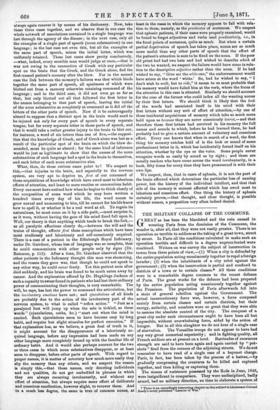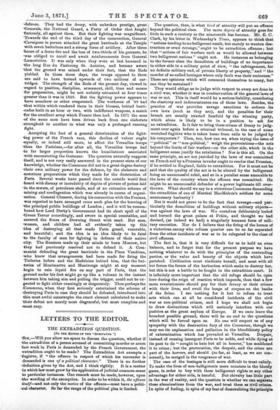THE MILITARY COLLAPSE OF THE COMMUNE.
GREAT as has been the bloodshed and the ruin caused in wresting Paris from the dominion of the Commune, the wonder is, after all, that they were not vastly greater. There is no operation so terrible to soldiers as the taking of a great town, street by street. In Paris all the conditions calculated to make such an operation terrible and difficult in a degree unprecedented were combined. Writers on war survey the subject of insurrection in towns from three points of view,—(1) When a city is defended by the entire population acting unanimously together to repel a foreign invader; (2) when the inhabitants of a city rebel against the government ; (3) when the insurrection is partial and confined to districts of a town or to certain classes.* All these conditions were in a remarkable degree common to the recent defence of Paris. The great works for the defence had been prepared by the entire .population acting unanimously together against the Prussians. The population of Paris afterwards fell into a state of general rebellion against the Government. The actual insurrectionary force was, however, a force composed mainly from certain classes and certain districts, but their energy, audacity, and numbers were so great that they were able to assume the absolute control of the city. The conquest of a great city under such circumstances ought to have been all but impossible, without overwhelming force, aided by the action of hunger. But in all this slaughter we do not hear of a single case of starvation. The Versailles troops do not appear to have had any very great numerical superiority ; and in fighting quality, all French soldiers are at present on a level. Barricades of enormous strength are said to have been again and again carried by " pot- shots " fired from the corners of the adjoining streets. We do not remember to have read of a single case of a bayonet charge. Paris, in fact, has been taken by the process of a battrte,—by gradually compressing the creatures to be killed and captured together, and then killing or capturing them.
The means of resistance possessed by the Reds in June, 1848, were insignificant in comparison. They were undisciplined, badly armed, had no military direction, no time to elaborate a system of
* There is an exceedingly interesting chapter on this subject in Lieutenant-Colonel Soady's lately published "Lessons of War."
'defence. They had the Army, with unbroken prestige, great 'Generals, the National Guard, a Party of Order that fought -furiously, all against them. But their fighting was magnificent. 'Towards the end of the third day of the insurrection, General 'Cavaignac in person attacked the great barricade at the Temple with seven battalions and a strong force of artillery. After three .hours of a fierce fire and the loss of two-thirds of his gunners, he -was obliged to recoil and await reinforcements from General ‘Lamoriciere. It was only when they were at last hemmed in 'the long Rue du Faubourg St. Antoine, and became aware 'that the ground was mined under their feet, that the Reds Tielded. In those three days, the troops opposed to them -ere said to have burned upwards of two millions of car- tridges. The strength of the Reds of the present day, viewed in -regard to position, discipline, armament, skill, time and means for preparation, might be not unfairly estimated as four times -greater than it was in 1848. But the fighting power appears to 'have somehow or other evaporated. The workmen of '48 had -that within which rendered them in their blouses, behind barn- -cedes built in an hour or two, with indifferent weapons, a match for the excellent army which France then had. In 1871 the sons of the same men have been driven back from one elaborate 'stronghold to another in what was only a prolonged running fight.
Accepting the fact of a general deterioration of the fight- ing power of the French race, this decline of valour ought -equally, or indeed still more, to affect the Versailles troops 'than the Parisians,—for after all, the Versailles troops had in far larger proportion known the humiliations associated 'with encountering the Germans. The question naturally suggests itself, and is not very easily answered in the present state of our knowledge, whether the Commune did not in a great degree destroy 'their own military power for the defence, by the elaborate and 'notorious preparations which they made for the destruction of Paris. Several weeks have passed since the outside world first- beard with dismay or incredulity of depots of picrate of potass laid -in the sewers, of petroleum shells, and of an extensive scheme of -mining and conflagration which was already in course of organi- -zation. General Cluseret, during his connection with the Fenians, was reported to have arranged some such plan for the burning of 'the principal public buildings of London ; and it will be remem- bered how Lord Derby's Government had its short spell of the -Green Terror accordingly, and swore in special constables, and covered the floors of Downing Street with sand. But men, -women, and children had all evidently taken up this idea of destroying all that made Paris grand, venerable, and beautiful ; and the idea is an idea likely to be fatal to the faculty of men for fighting in defence of their native -city. The Russians made up their minds to burn Moscow, but they had previously resolved not to defend it. A Com- -munist defending the great barricade in the Place Vendenne, -who knew that arrangements had been made for firing the Tuileries before and the Madeleine behind him, that the bat- teries of Montmartre and Montrouge might at any moment begin to rain liquid fire on any part of Paris, that the .ground under his feet might go up like a volcano in the instant between him taking aim and pulling the trigger, could not be ex- pected to fight either cunningly or desperately. Thus perhaps the Commune, when they first seriously entertained the scheme of 'destroying Paris in case they should be defeated, introduced into this most awful catastrophe the exact element calculated to make -their defeat not merely most disgraceful, but most complete and 'most easy.



































 Previous page
Previous page